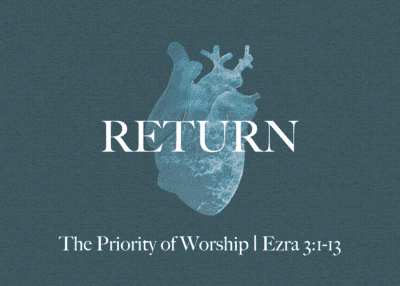My daughter is almost five (going on 15), and one morning, in between bites of sugary cereal, she sang with one hand in the air and the other cradling her spoon. I asked her what she was doing.
“I’m praising God, Mama.”
Then, in a huff of overly dramatized exhaustion, she dropped her hand on the table saying, “But sometimes praising God is hard. My arms get sooooo tired.”
I laughed, both because it was funny and because it was true. Lately, praising God has been hard for me. It’s been one of those seasons when praise gets lodged in my throat and, like my daughter, I drop my arms on the table exclaiming, “It’s too hard!”
A New Way of Worship
The entire book of Hebrews is about a new way of life and a new way of worship. Previously the Jews had been burdened with fulfilling the law, but by his sacrifice and death-defeating resurrection, Christ had set them free from its impossible standards.
Hebrews 13:15 says, “Through him then let us continually offer up a sacrifice of praise to God, that is, the fruit of lips that acknowledge his name.”
The animal sacrifices of the Old Testament that had once brought a pleasing fragrance to God are now replaced with the fruit of lips that acknowledge his name in spirit and in truth (Leviticus 23:18; John 4:24).
A sacrifice is a gift to God declaring that he is worthy, and we are not. It is also, by definition, difficult. A sacrifice hurts, it’s costly, it takes effort—and the ultimate sacrifice cost the Messiah, Jesus Christ, his life. Likewise, for us, a sacrifice of praise won’t always be easy and effortless, but difficult and costly.
Three Reasons Praise Is Hard
But why is praise so hard? Why can words of worship and thanksgiving get lodged in my throat, diminished, or forgotten all together?
Suffering
Not a day passes when we don’t face suffering, loss, or grief in one way or another. Suffering follows us because we are people broken by sin, living in a broken world. In my experience, suffering, loss, and grief have been very effective in blocking my ability and desire to praise God. In these times, the burden of offering such a sacrifice seems impossible—and I know I am not alone in this.
Like Habakkuk, I’ve said, “O Lord, how long shall I cry for help, and you will not hear?” (Habakkuk 1:2).
Walking through death, disease, miscarriage, infertility, and tragedy is a common theme since the fall of man. It is inescapable. Habakkuk’s words, at one time or another, have taken up residence in my heart, stripping me of the ability and desire to praise God.
Abundance
However, praise doesn’t only disappear from my heart and vocabulary in suffering times—abundance can have the same result. When it seems like I have it all together, I can neglect praise. When suffering isn’t my companion and fear doesn’t plague me, I can come dangerously close to making myself a god and the lord of my life. In this way, I dethrone God from his rightful place as Lord and cozy up in his seat. I rest comfortably in the ease of his blessings that I imagine are of my own making.
I am carrying on the legacy of the forgetful Israelites whom Moses warned saying, “Take care that you do not forget the LORD, who brought you out of the land of Egypt, out of the house of slavery” (Deuteronomy 6:12).
Mundanity
Then there’s that stretch of time between suffering and abundance: mundanity. When the days are mundane, routine, and regular, the very rhythm of it lulls my heart to sleep.
There is no praise because there’s no pain. There is no praise because there’s no abundance. Somewhere between diaper changes, school pickup, and dinner, praise fades and Almighty God is made to appear very small. Praise isn’t stripped away as in times of suffering and pain. It isn’t forgotten as in times of abundance and peace. Praise is blurred into the noisy background of life, diminished to nothing more than a fly on the wall.
In the rhythms, I neglect my primary calling to “seek first the kingdom of God and his righteousness” (Matthew 6:33) and the admonition from Psalm 46:10: “Be still and know that [he is] God.”
A Worthy Sacrifice
Because of Scripture, we know that we don’t just confess God’s name when it feels good, looks good, or benefits us in some way. We offer praise, as Hebrews 13:15 says, “continually.” This means without ceasing, in all circumstances. Like Paul said in I Thessalonians 5:18, “Give thanks in all circumstances; for this is the will of God in Christ Jesus for you.”
It is our duty to offer “the fruit of lips that acknowledge his name” (v. 15). Therefore I am learning to commit to acting out the duty of praise as the beginning of joy, rather than the result of it.
And, as this verse says, we’re able to do all this “through him.” Through Jesus, we’re able to see the great, great love of our great, great God who holds everything in the palm of his hand and bends it to his will with a word. Through Jesus, our mediator, we’re able to access the Father in order to give him due praise (1 Timothy 2:5).
Nehemiah says, “The joy of the Lord is our strength” (8:10). Through praise we enjoy God—imagine that! Praise focuses us on where our joy comes from and where our gaze should be, and the result is our strength! Whether through prayer, meditation on God’s Word, thanksgiving, or praise, we can lift tired hands even when it’s hard—especially when it’s hard—and say, “Holy, Holy, Holy, is the LORD!” (Isaiah 6:3).







